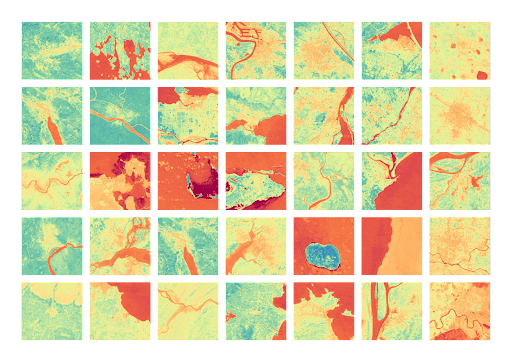IAAC – Institute for Advanced Architecture of Catalonia
Global Summer School Program 2023
Online Course: Urban Analytics
Duration: from the 17th until the 21st July 2023
GEO-DATA MINING AND CITY MAPPING

Ph credits: GSS22 Urban Analytics Faculty team: Iacopo Neri, Eugenio Bettucchi.
Syllabus
Data is ubiquitous in our lives, from our daily interactions to our work. It has inundated our cities, transforming their productive sectors, and is now being used to train AI models that promise to revolutionise society. However, despite more than 50 years since the information age began, the long-awaited wisdom has yet to arrive. It is evident that quality, data ownership, interoperability, scalability, and objectivity are crucial topics that need to be addressed in the current debates about the future of data.
To address these challenges, designers and creative thinkers need to rethink our relationship with data and find innovative solutions that empower citizens instead of solely extracting data for products. Although private agents are using opinionated data to improve their services, post-COVID strategies of the most advanced cities are struggling to create a sustainable and positive environment for their citizens. An alternative understanding of contemporary urban phenomena is required to support these cities, one that doesn’t reject data but creatively transforms it into inspiring new representations for planning.
The purpose of this course is to introduce participants to geospatial data analytics with a focus on understanding and representing urban patterns. It aims to answer the question of the nature of the city by analyzing its services and urban fabric. The resulting workflow allows for a comparison between different locations and functions as an advanced basemap for further specific analysis.
Main tools:
- Rhinoceros 7 (Win)
- Grasshopper 3D
Learning objectives
At course completion students will be asked to:
- Manipulate and combine data from different data source and data typologies
- Set up a flexible protocol to analyze different urban contexts in the world
- Learn the basics of APIs
- Learn how to creatively represent geospatial data and how to create a web map
Previous Knowledge / Students background requirements
The workshop is open to all applicants with a bachelor degree related to the fields of Architecture, Design, Arts and Engineering willing to engage in the program. No previous extensive knowledge is required. The participants will receive lectures and classes to be introduced to the workshop’s topics, softwares and tools.
Students will be introduced to basic and intermediate tasks of programming and visual programming. No previous knowledge of scripting is needed. Students need to use their laptop and a list of installable links will be sent a few days before the program starts.
Faculty

Iacopo Neri’s research lies at the intersection between architecture, computer science and urban planning. He has been involved in teaching activities since 2015 at the University of Florence, The Polytechnic University of Milan, the Ecole des Ponts – ParisTech, the Harbin Institute of Technology, and at IAAC, where he is currently faculty of urban computational design and part of the AAG’s Computational Urban Design Research Team. Additionally, he is serving as a scientific collaborator for the MPG Center for Digital Visual Studies – University of Zurich – and as a front-end web developer for Noumena, Barcelona.
linkedin.com/in/iacopo-neri-25a375132
Faculty

Eugenio Bettucchi is a civil engineer with a degree in Building Engineering & Architecture from Alma Mater Studiorum, University of Bologna (IT). Eugenio developed his thesis focusing on robotic material deposition based on real-time feedback. Actually he is senior designer and 3d printing expert at Noumena, Barcelona, his interests and skills lie in computational design and digital fabrication. Eugenio is part of the IaaC faculty team at IAAC ‘s MRAC (master in Robotic and Advanced Construction) and MaCT (master in Cities and Technologies) programmes. He is also involved in the ROMI project (Robotics for Micro Farming) contributing to the development of autonomous aerial solutions.
linkedin.com/in/eugenio-bettucchi-b59683b5
https://www.instagram.com/eugeniobettucchi/
WEEKLY SCHEDULE & TIMETABLES
Option 1 – Synchronous calendar (Barcelona time – GMT+2)
Recommend to European, African, Asian and Australian participants.
From Monday 17th July until Thursday 20th July 2023
Teaching activities will run from 10.00 to 14.00 GMT+2
– 8 hrs of live teaching
– 8 hrs of live mentoring and exercises review
– 1 hr of IAAC summer lecture
– Final GSS diploma certificate ceremony
Option 2 – Asynchronous calendar (America time – GMT-4)
Solution recommended to participants from all the time zones who are looking for a more flexible schedule.
From Monday 17th July until Friday 21st July 2023
Live teaching activities will run from 11.00 am to 1.00 pm (GMT-4)
– 8 hrs of recorded teaching
– 8 hrs of live mentoring and exercises review
– 1 hr of IAAC summer lecture
– Final live GSS diploma certificate ceremony
Software & Hardware Requirements
– Rhinoceros 7 (The 90-days trial version can be downloaded from https://www.rhino3d.com/download/rhino/evaluation (Windows)
– Grasshopper 3D
– Code Editor (Visual Studio Code or PyCharm (Community) or Jupyter Notebook, etc.)
– Python 3.8
All required softwares should be installed prior to the beginning of the workshop. The Grasshopper addon Urbano v.1.3.3 will be required for the first day of workshop. Prior installation is preferable but not mandatory. As for other additional add ons, the installation will be finalised during classes.
GRASSHOPPER PLUGINS:
Human https://www.food4rhino.com/en/app/human
Shortest walk https://www.food4rhino.com/en/app/shortest-walk-gh
Decoding spaces https://toolbox.decodingspaces.net/
Tarsier https://www.food4rhino.com/en/app/tarsier (Windows)
Impala https://www.food4rhino.com/en/app/impala (alternative to Tarsier, used for faster closest points)
Hardware
8 GB memory (RAM) or more. At least 4 GB space in the hard drive.
Operational System
Windows 10.

